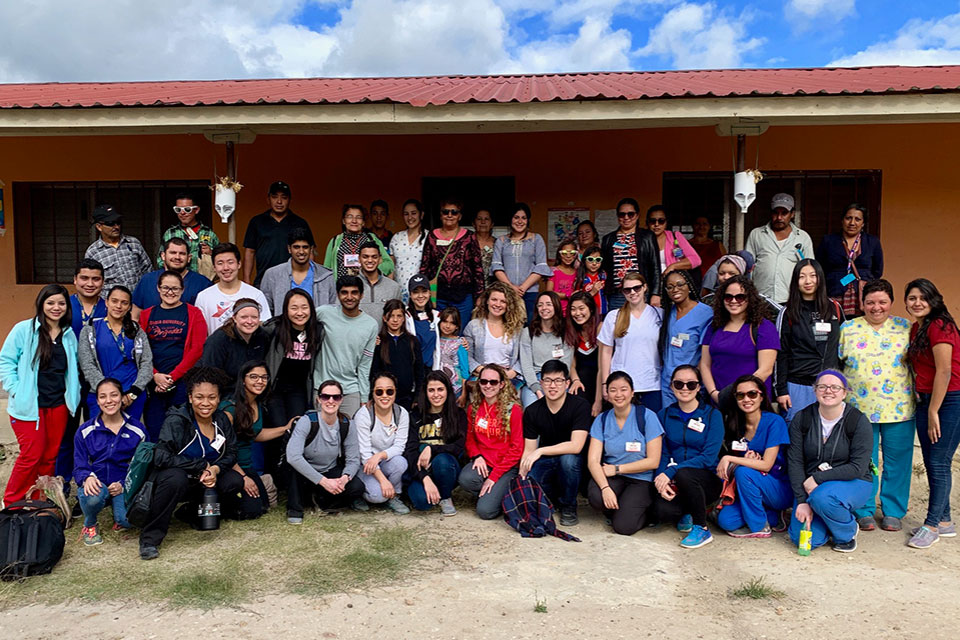Making an International Impact with Global Medical Brigades
Written By: Mark Chen and Jianne Castelo De Raya, First- and Second-Year Student Pharmacists
Global Medical Brigades is an international organization that provides students around the world with opportunities to visit rural areas in developing countries, where they volunteer to help address the health care needs that exist in those communities. The University of Maryland, Baltimore’s (UMB) Global Medical Brigades chapter offers a volunteer opportunity for which students from across all of the schools on campus can apply to participate. This year, a team of 17 students from UMB and nine students from Brown University set out to help tackle some of the health care challenges faced by patients living in Honduras.
Below, two School of Pharmacy students who participated in the January trip share their perspectives.
Learning from the Individuals You Serve
As told from Mark’s Perspective
I was incredibly grateful to have the opportunity to visit Honduras with the Global Medical Brigades from Jan. 6-12. Coming into pharmacy school, I knew that I wanted to travel and gain as many unique experiences as possible. Getting involved with Global Medical Brigades would help me fulfill both of those aspirations, so it only made sense that I apply to volunteer for one of its upcoming trips.
After learning about the organization and the important work its members are doing around the world, I knew that Global Medical Brigades would also be the best option to help me gain a better understanding of other cultures. As an aspiring pharmacist, it is crucial that I be able to connect with people from any background, and I knew that, by giving myself the opportunity to engage with a community in a different environment, I would be able to see and experience other perspectives, as well as learn from them.
During the trip, our activities focused on two elements:
- Helping the local community.
- Giving volunteers the opportunity to learn and make our own impact.
I will never forget the day when we were given the opportunity to construct an eco-stove for a family. An eco-stove is a small, efficient, and well-ventilated wood burning stove that has been shown to improve health outcomes when used in place of a traditional stove, as well as address a number of ecological challenges, including deforestation. It took our small team of four an entire day to finish installing the stove. However, at the very end of the installation process, we learned that the mason who was supervising us could have completed the task in less than four hours alone. He wanted to give us the opportunity to make our own impact and be proud of our contribution to the family.
The time that I spent in Honduras taught me the importance of connecting with the people you serve. If you find one day that you have completed all of your tasks and have a little bit of downtime, take that opportunity to sit down with another person and get to know their story. This truly helped make my experience with Global Medical Brigades much more fulfilling. I highly recommend that everyone not only get involved in their communities, but also take the time to immerse yourself in getting to know the people who live in those communities.
Becoming Immersed in the Local Culture
As told from Jianne’s Perspective
Getting involved with Global Medical Brigades is one of the best decisions I have ever made. Growing up, I witnessed the impact my mother had as a volunteer nurse at the first aid stations at our annual county fairs. In fact, it was her actions that inspired me to participate in the recent Global Medical Brigades trip to Honduras — I wanted to have the opportunity to provide health care to patients in need, while also building cultural competency.
Although I was initially hesitant to participate in the experience because I did not speak Spanish, or even know most of the brigade volunteers, my hesitations quickly dissipated when I saw how the people living in the communities genuinely welcomed our team members and integrated us into their lives.
Throughout the trip, each brigade volunteer had an opportunity to dispense medications, assist with dental and eye examinations, and engage in “charla” (chats) with the children about key health practices. We even had the chance to participate in medical consultations under the supervision of a Honduran physician. One of my favorite activities was visiting patients’ homes for hypertension and diabetes screenings in the hospitable community of Cuscateca. It was through this experience that I gained some valuable insights into patients’ daily lives, with the help of our translators.
Overall, traveling to Honduras with Global Medical Brigades was a humbling experience, and it encouraged me to re-evaluate my own life. Witnessing the most exhilarating smiles on the faces of elderly patients after they put on new prescription glasses was truly indescribable, and an experience I will always take with me. This experience not only immersed me in the culture of Latin America, but also reminded me about how important it is to never take for granted the little things in life, including access to clean and safe water.
If you are interested in learning more about Global Medical Brigades at UMB, please visit the chapter’s website here.


